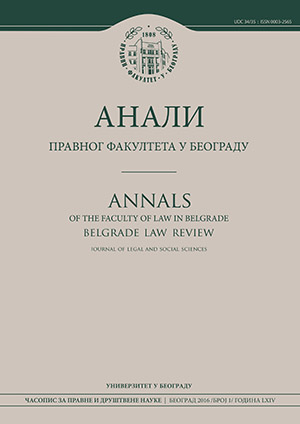УСЛОВНИ ОТПУСТ – ПРАВНА И ПЕНОЛОШКА АНАЛИЗА
PAROLE – LEGAL AND PENOLOGICAL ANALYSIS
Author(s): Đorđe M. IgnjatovićSubject(s): Criminal Law, Human Rights and Humanitarian Law, Criminology
Published by: Правни факултет Универзитета у Београду
Keywords: Parole; Convicted persons; Privileges; Recidivism; Prisons; Overcrowding;
Summary/Abstract: This paper firstly points out to historical and comparative state of parole in American and European law, which is an introduction into analysis of transformation in its regulation in criminal substantial, procedural and enforcement law in Serbia. Today there are two models (obligatory and discretionary) of parole, which is allowed after 2/3 of the served sentence of imprisonment. At the same time special Code on prevention of sexual victimization of juveniles – contrary to the Criminal Code– abolishes a possibility of earlier release of all offenders of sexual crimes against juveniles. The author argues in favor of abolishment of parole prohibition for any category of offenders; restoration of the rule that half of the served sentence of imprisonment is a condition for consideration of request to be released on parole (only exceptionally for recidivists and those whose criminal habit has been proven conditional release would be allowed after 2/3 of served sentence); proposes specification of substantial requirements for approval; retention of solution that the court decides on conditional release, but with obligatory invitation of convicted person who would be entitled to comment on allegations made at hearing; judge for execution should also attend the procedure; an explanation must be justified by precise reasons which were decisive for the court; the appellate court should not only deal with formal aspects of procedure in deciding on contested verdict, but also with merits of arguments on which it is based; politicians should publicly explain the importance of parole in situations that make the public concerned because of media reporting about incidents in which conditionally released persons commit serious crimes; finally criminological sciences should be engaged in research that would help in searching for a suitable model of parole, which would be in accordance with international instruments and jurisprudence of the European Court of Human Rights.
Journal: Анали Правног факултета у Београду
- Issue Year: 64/2016
- Issue No: 1
- Page Range: 31-66
- Page Count: 36
- Language: Serbian

